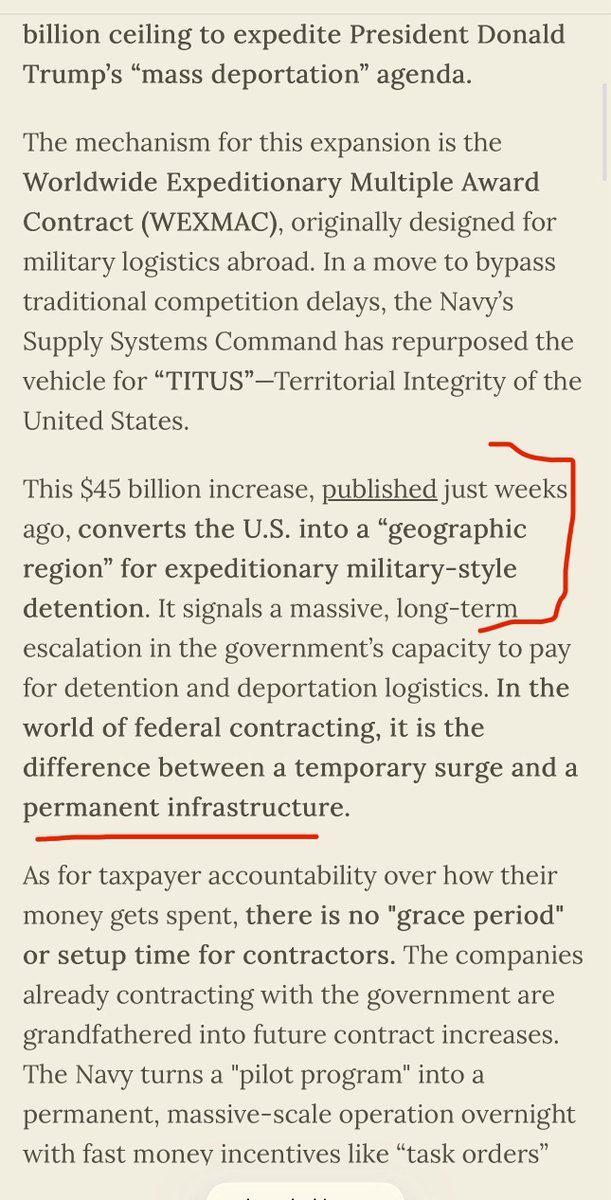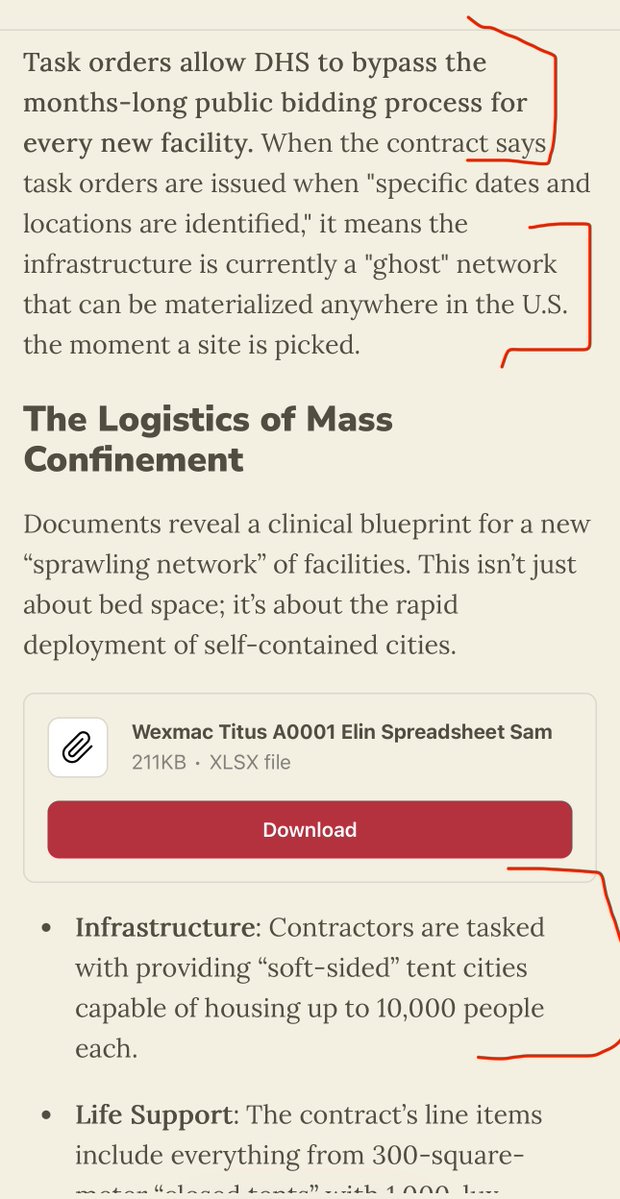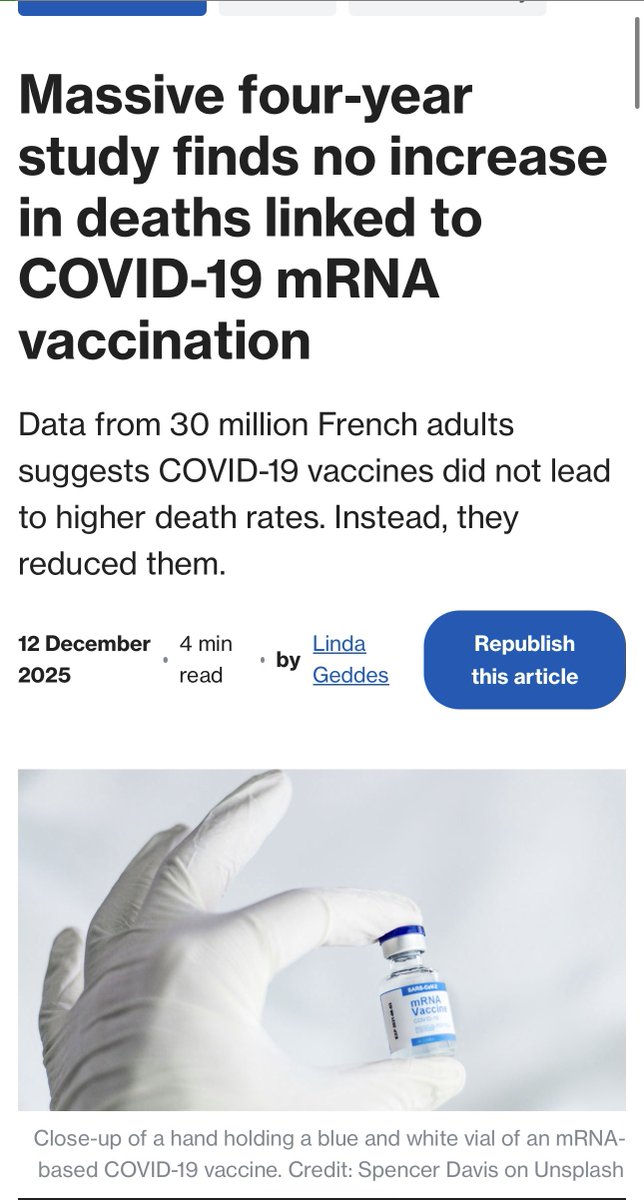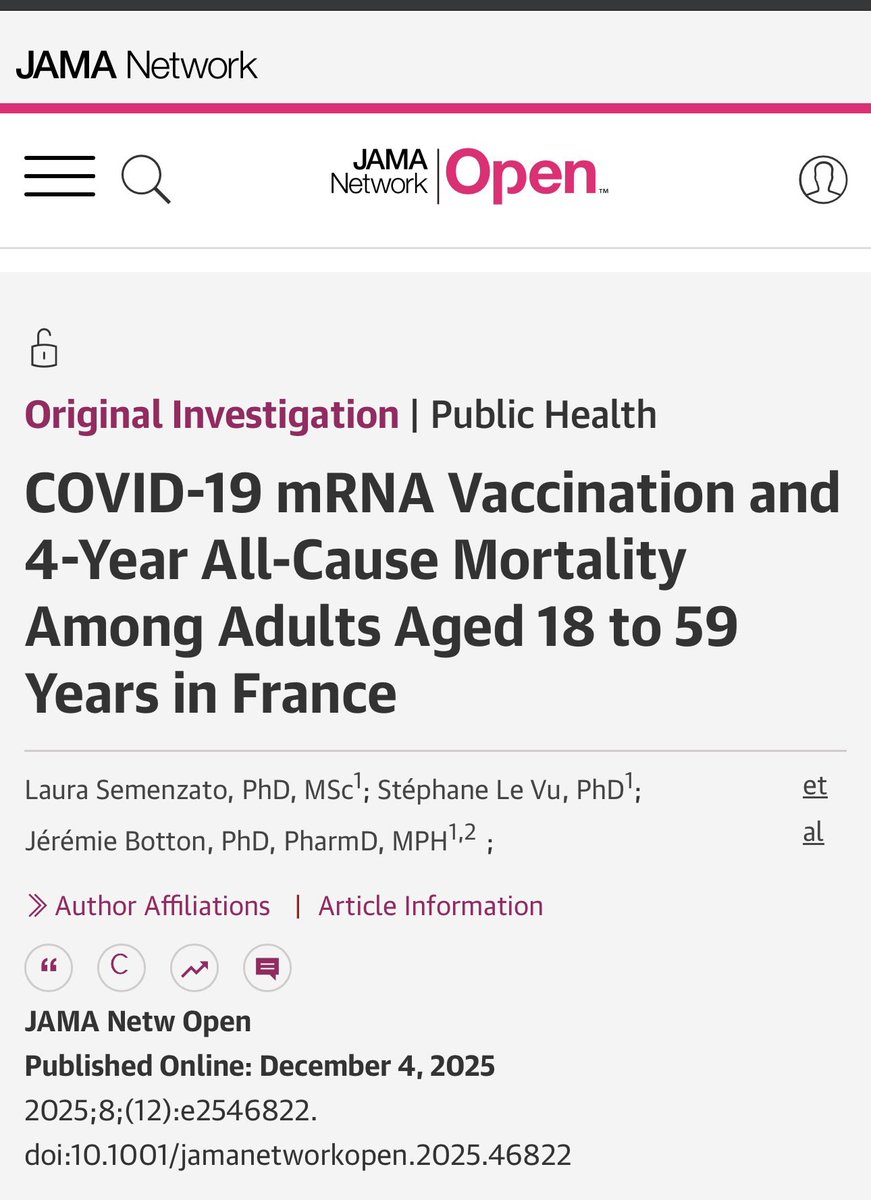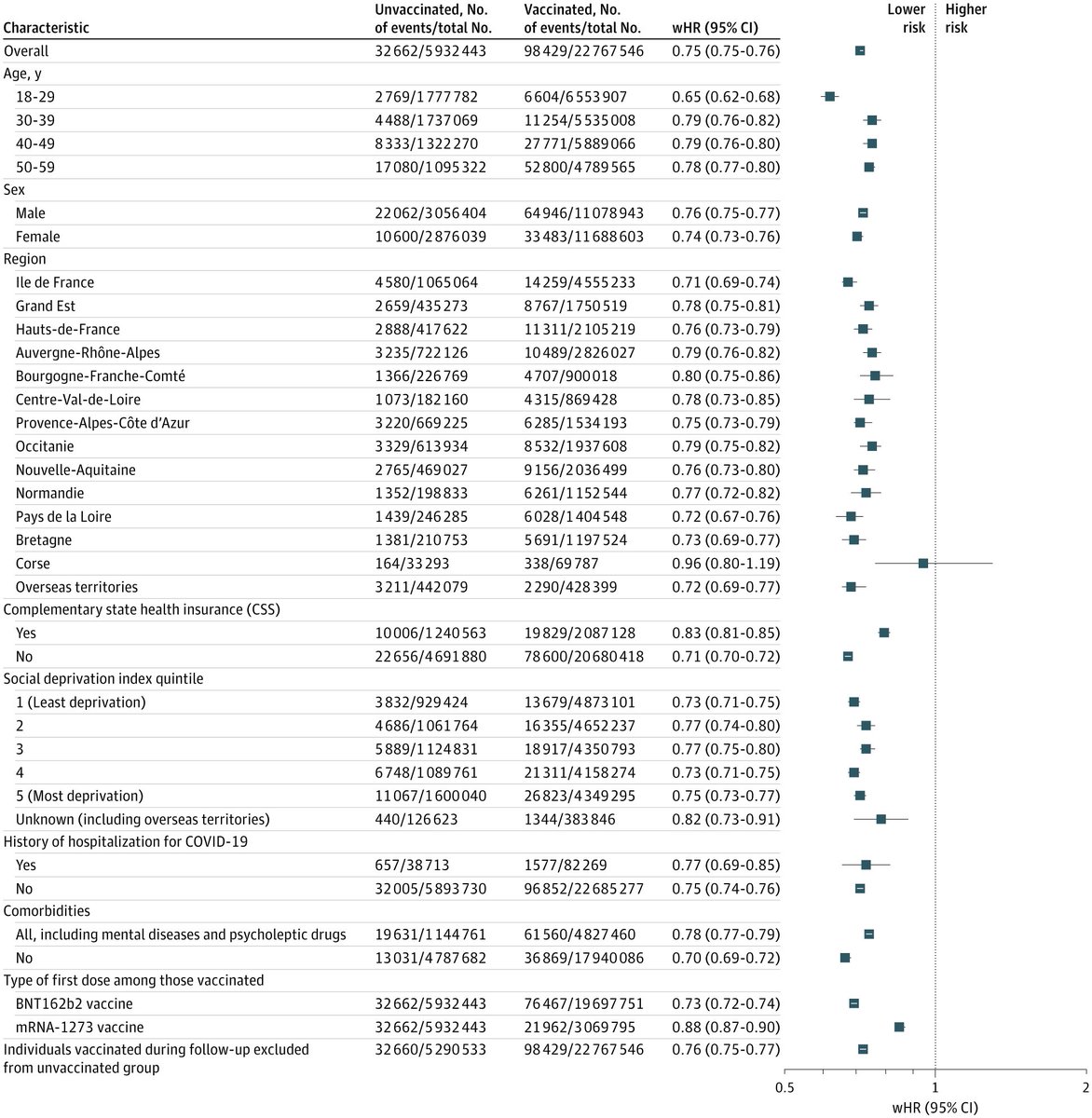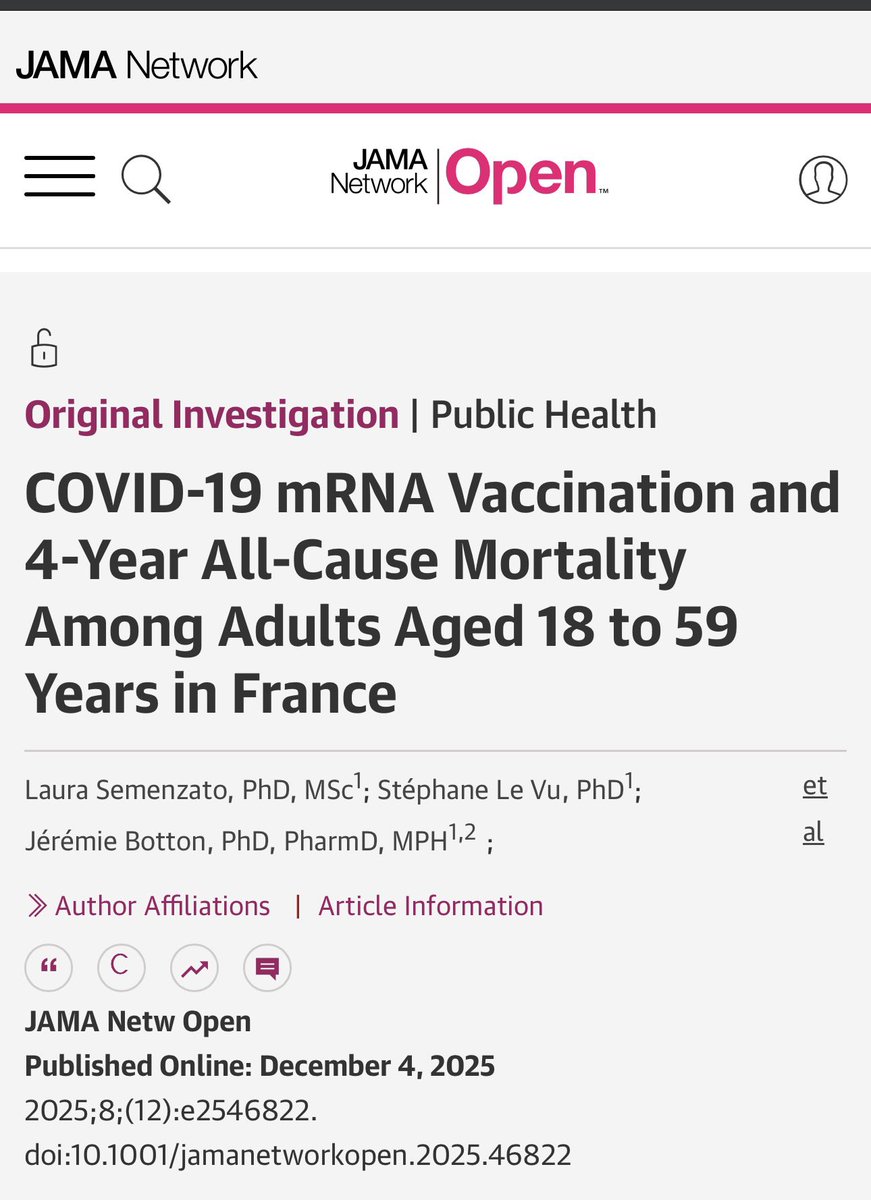Getting worried—Dairy cow avian flu has now infected a man in Texas—first H5N1 avian flu likely transmitted via dairy cows (second U.S. H5N1). Several states have recently reported detecting H5N1 in cattle, which only recently started carrying avian flu.🤔
statnews.com/2024/04/01/bir…
statnews.com/2024/04/01/bir…
2) This is not April Fool’s—official statement:
“The Texas Department of State Health Services (DSHS) is reporting the first human case of novel avian influenza A(H5N1) in Texas. The patient became ill following contact with dairy cows presumed to be infected with avian influenza. The patient’s primary symptom was conjunctivitis. This is the second case of avian influenza A(H5N1) identified in a person in the United States and is believed to be associated with the recent detections of avian influenza A(H5N1) in dairy cows announced by the Texas Animal Health Commission.”
dshs.texas.gov/news-alerts/he…
“The Texas Department of State Health Services (DSHS) is reporting the first human case of novel avian influenza A(H5N1) in Texas. The patient became ill following contact with dairy cows presumed to be infected with avian influenza. The patient’s primary symptom was conjunctivitis. This is the second case of avian influenza A(H5N1) identified in a person in the United States and is believed to be associated with the recent detections of avian influenza A(H5N1) in dairy cows announced by the Texas Animal Health Commission.”
dshs.texas.gov/news-alerts/he…

3) “DSHS is issuing this health alert to provide awareness to healthcare providers and ask them to be vigilant for people with signs and symptoms of avian influenza A(H5N1). Suspicion for avian influenza A(H5N1) should be heightened for people who have had contact with animals suspected of having avian influenza A(H5N1).”
dshs.texas.gov/news-alerts/he…
dshs.texas.gov/news-alerts/he…
4) Signs and symptoms of avian influenza A(H5N1) infection may include:
•Fever (temperature of 100°F [37.8°C] or greater) or feeling feverish or chills
•Cough
•Sore throat
•Runny or stuffy nose
•Headaches
•Fatigue
•Eye redness (conjunctivitis)
•Difficulty breathing/shortness of breath
•Diarrhea
•Nausea
•Vomiting
•Seizures
•Fever (temperature of 100°F [37.8°C] or greater) or feeling feverish or chills
•Cough
•Sore throat
•Runny or stuffy nose
•Headaches
•Fatigue
•Eye redness (conjunctivitis)
•Difficulty breathing/shortness of breath
•Diarrhea
•Nausea
•Vomiting
•Seizures

5) RESPIRATORY— this is also a respiratory infection folks… which means you know what… possibly #airborne.
“Illness in humans with avian influenza A(H5N1) virus have ranged from mild to severe. Reports of severe avian influenza A(H5N1) illness in humans have included fulminant pneumonia leading to respiratory failure, acute respiratory distress syndrome, septic shock, and death.”
“Illness in humans with avian influenza A(H5N1) virus have ranged from mild to severe. Reports of severe avian influenza A(H5N1) illness in humans have included fulminant pneumonia leading to respiratory failure, acute respiratory distress syndrome, septic shock, and death.”
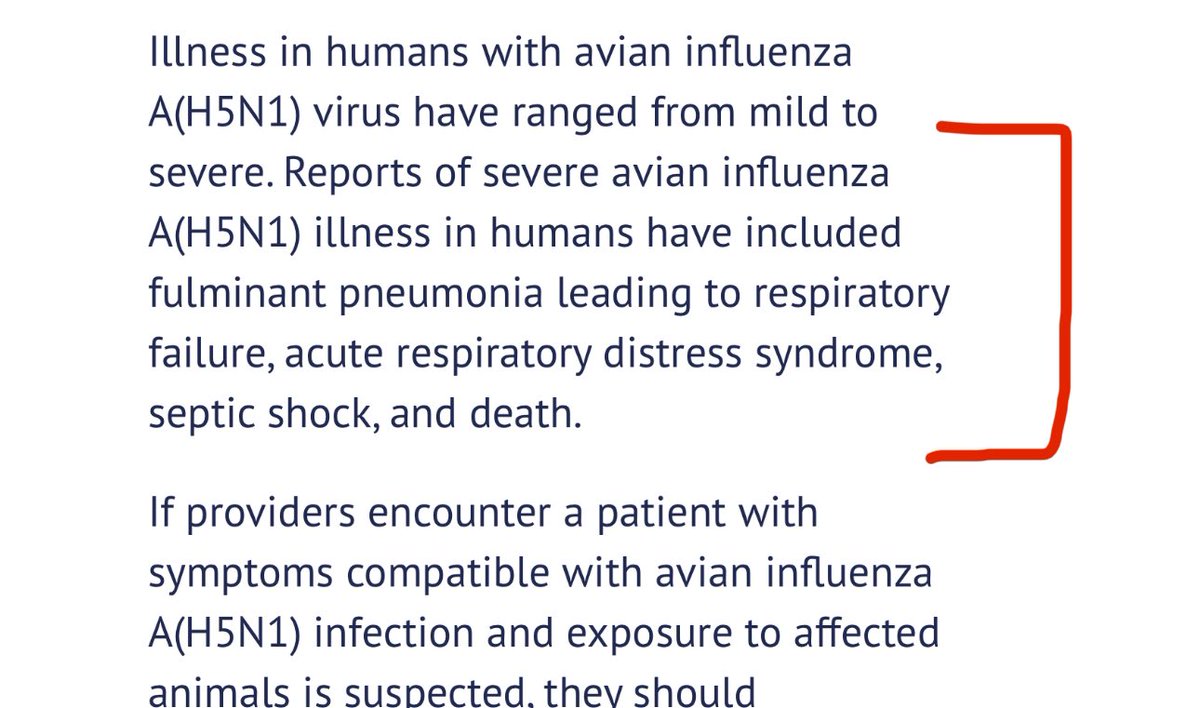
6) I see they are still invoking the “6 feet rule” & “secretions” for defining close contacts of a respiratory virus— do we never learn? Can we maybe warn people about even the possibility that it’s airborne?? C’mon. 

7) “AIRBORNE PRECAUTIONS”—thankfully they acknowledge later the need for airborne precautions against H5N1, which is very prudent given its respiratory disease and influenza previously has shown airborne transmission too. Many cattle feeding areas have poor ventilation too. 

8) Okay folks— I should explain why I’m worried suddenly—H5N1 has been circulating in birds worldwide for a while now, and many mammals too. But all that spread took a while in the backdrop of the last 2 years. But the dairy cow thing is VERY NEW— only last week—but suddenly in MULTIPLE DISTANT STATES — cows don’t usually fly from Michigan to Texas to Idaho and NM”” ➡️and now suddenly in human case within a week. That’s quite a sudden timeline. 💡this is why I’m suddenly worried.

9) I hope the @CDCgov will really step up on H5N1 and trace all the cases—there will be inevitably be more human avian flu cases. This will be just the tip of the iceberg. I hope @CDCDirector will put PREVENTION and CONTROL first above corporate interests.
https://twitter.com/DrEricDing/status/1770110880488808769
@CDCgov @CDCDirector 10) there is extensive cow to cow transmission for this epidemic among dairy cows to be happening on such a large scale. Which means the virus is adapting toward mammal to mammal transmission, than just incidental bird to mammal before.
https://twitter.com/dgurdasani1/status/1774993636473593930
11) Apparently I just learned from conspiracy circles that I have now been “activated”. Lol.
Debunk— no I have not, nor have I ever shilled for anyone. Anyone who knows me I just worry for public health & for the world.
➡️E.g. Last time 4 years ago…
nymag.com/intelligencer/…

Debunk— no I have not, nor have I ever shilled for anyone. Anyone who knows me I just worry for public health & for the world.
➡️E.g. Last time 4 years ago…
nymag.com/intelligencer/…

12) if you want to understand me… just read this old piece from ~13 years ago…
archive.nytimes.com/well.blogs.nyt…
archive.nytimes.com/well.blogs.nyt…
https://twitter.com/drericding/status/1473182266541195267
13) Some folks have asked—what signals am I looking for next? (If gets worse):
📌Community transmission with no farm contact
📌mutations that allows faster binding to human receptors
📌outbreaks of community transmission in multiple regions
📌denialism of above, despite data
📌Community transmission with no farm contact
📌mutations that allows faster binding to human receptors
📌outbreaks of community transmission in multiple regions
📌denialism of above, despite data
14) let’s pray we don’t repeat the same mistakes as during early COVID… for example these mistakes that Fauci now admits (but which he and others at WHO/CDC had dismissed early on)… the precautionary principle saves lives.
https://twitter.com/drericding/status/1640464920822304770
15) The numbers— so far, 7 herds of dairy cows have tested positive in Texas for the new Highly Pathogenic Avian Influenza, bringing total now to 11 confirmed dairy herds in 5 states (more pending). The NVSL has also confirmed that the strain of the virus found in subsequent states is very similar to the strain originally confirmed in cattle in Texas and Kansas that appears to have been introduced by wild birds (H5N1, Eurasian lineage goose/Guangdong clade 2.3.4.4b).
aphis.usda.gov/news/agency-an…
aphis.usda.gov/news/agency-an…

16) Cats have also tested positive in the dairy cow H5N1 avian flu probe, already previously found. ➡️But cow cases are more unusual, because **no influenza A had ever been reported in ruminants** (cattle/bison species) before. Hence cow infections unusual
cidrap.umn.edu/avian-influenz…
cidrap.umn.edu/avian-influenz…
17) excellent thread from a scientist who had studied and followed avian flu for many years. There is a real risk of virus recombination between H5N1 and a human flu strain that will merge to make a “worst of both worlds” human-avian flu strain. 👇
https://twitter.com/petermbenglish/status/1775080177103495659
• • •
Missing some Tweet in this thread? You can try to
force a refresh


